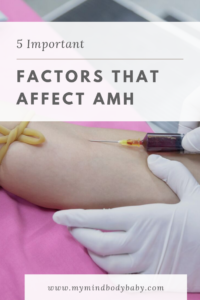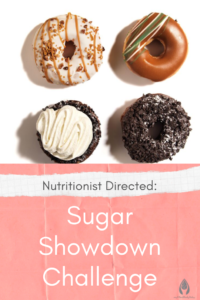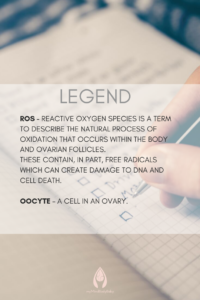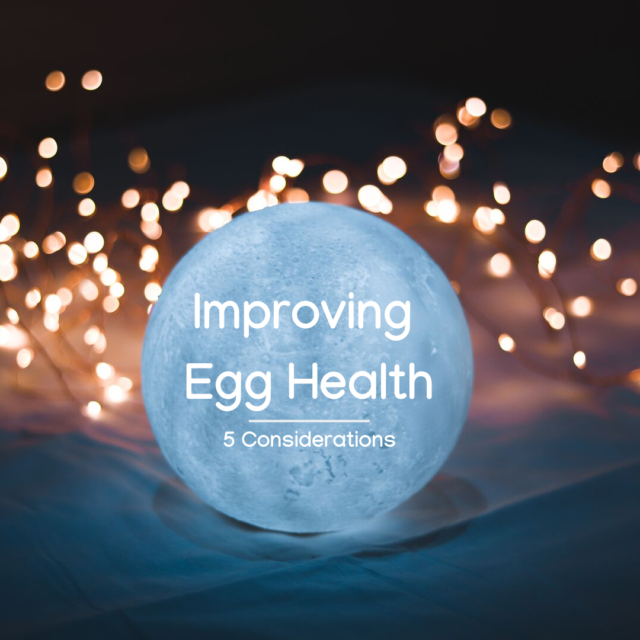“Egg Health and Fertility: 5 Ways to Support Conception” | By myMindBodyBaby
Picture this.
On the day you were born, your teeny tiny ovaries contained all the egg cells you were ever going to have in your lifetime. Crazy right!?
“During fetal life, there are about 6 million to 7 million eggs. From this time, no new eggs are produced. At birth, there are approximately 1 million eggs; and by the time of puberty, only about 300,000 remain. Of these, only 300 to 400 will be ovulated during a woman’s reproductive lifetime.” Cleveland Clinic
While we cannot control the number of eggs we produce, our lifestyle CAN impact the QUALITY of these precious little eggs.
How you ask?
Let’s dive in.
Quantity vs Quality.
For many women, myself included, before trying to conceive, the quality of my eggs was never something on my radar. I just assumed, like most, that when I wanted a baby I’d be able to have one.
It wasn’t until my husband and I had sought some assistance from a fertility clinic that I realized that my idyllic dreams of a “normal” conception would be replaced with conversations about sperm quality, egg quality, medications, number and size of follicles, plus a host of other unsexy topics surrounding making a baby.
One common blood test that many women (including myself) receive when they start fertility assistance is the Anti-Mullerian Hormone (AMH). This is a hormone produced by the ovarian follicles that gives an estimation of the number of follicles inside the ovaries. This then helps give an approximation of a women’s egg count (ovarian reserve).
Your AMH levels, plus other important factors like your age, lifestyle, health history and your partner’s health all help your doctor determine the best type of treatment for you while also estimating your chances of conception.
Factors that affect AMH
While your AMH level is a helpful snapshot of what your ovarian reserve is, it is not a perfect test; it can be influenced by a variety of factors. Therefore, if your AMH isn’t ideal, it’s important to look at what could be impacting this number. Here are a few influencing factors:
- Age. AMH levels decrease as you age.
- Stress. Believe it or not, psychological stress has been attributed to lower levels of AMH. One study showed “Higher psychological stress was related to a decreased AMH level in infertile women and psychological stress may affect ovarian reserve.”

- Vitamin D. Promising studies are correlating vitamin D levels and serum AMH levels. This study shows that “Vitamin D may be a positive regulator of AMH production in adults… Vitamin D deficiency should be considered when serum AMH levels are obtained for diagnosis.”
- PCOS. According to this retrospective study in the Journal of Fertility and Sterility, “data suggests that AMH declines more rapidly in women with PCOS. AMH levels >5 may have a negative impact on IVF success in women with PCOS. A normal or high AMH level in women with PCOS should be cautiously interpreted as it may decline rapidly, and very high levels may be detrimental for IVF success.”
- Endometriosis and Ectopic Pregnancy Surgery History. Studies are showing those who have undergone surgery for the above have a higher risk of low AMH levels.
* If you do have low AMH levels, consider having your Vitamin D levels checked and ensure this is in a healthy range. It’s also important to look at your stress levels. Where are they coming from, how do they affect you and what can you do to adjust your perspective or the stressor itself? blog link?
While the factors listed above can impact AMH levels and should most certainly be taken into consideration during treatment protocol and decision-making, it is critical to also understand how individuals can play a role in supporting the QUALITY of the eggs they do have.
Healthy Eggs Need:
Protein.
Protein is one of the primary building blocks of cells in the human body. We need protein for structure, repair and making new cells.
We learned earlier that women carry all the egg cells they will ever have in one lifetime. But they lie dormant for months, years, decades until they begin to mature. Once they are given the hormonal signal (some say this is about 90-150 days before an egg has the potential to be released), egg cells begin to grow. Protein is in heavy demand for this maturation process.
Not all protein is created equal though. When choosing protein, opt for organic (more here), lean cuts of meat like poultry and fish, choose high quality free range or organic eggs and plenty of plant based proteins like hemp hearts, lentils and raw nuts and seeds.
As a side note, research is showing that consuming more protein from plant based sources vs animal reduced ovulatory infertility risk for women.
Optimal gut health.
I think many of us take for granted the ability of our body to breakdown food and absorb nutrients properly. However, in my 12 years of clinical practice seeing clients, I know firsthand that many people struggle with their digestion. Stress, age, and poor quality foods are just a few of the reasons why.
The link between gut health and fertility is not often spoken about, but in my opinion is a fundamental concept when it comes to cellular egg health. Apart from external factors like age, dietary choices and stress, our gut controls the breakdown and distribution of nutrients vital for all aspects of human function. Very simply, if our gut isn’t healthy and doing it’s job, than how can we expect our eggs to be?
Balanced blood sugar and hormones.
This is absolutely critical.
Under normal conditions, after we eat food blood sugar and insulin (a hormone secreted when blood sugars start to rise) increases. This tells cells and muscles to uptake sugar, which is used for energy. Once this happens, blood sugar and insulin begin to drop back down to a normal state.
When this process is thrown off due to poor food or lifestyle choices, stress and potentially some medical factors, the body can in time resist the signal of your cells and muscles to uptake sugar properly – this is called insulin resistance. The result? Too much insulin circulating can impact the whole cascade of hormones responsible for optimal fertility. For example, excess insulin drives up the production of testosterone (male hormone), which can halt ovulation and therefore impact pregnancy chances.
Follicle stimulating hormone (FSH) and luteinizing hormone (LH), estrogen and progesterone – all vital hormones involved in the conception process – also become out of balance or their production falls short when insulin is in excess.
To top it all off increased insulin leads to increased inflammation, weight gain and increased risk of Type II diabetes, metabolic disorders, cardiovascular disease and even cancer. Yikes!
So what to do? One of the biggest contributors to blood sugar and hormonal challenges is diet. In particular the over-consumption of simple carbohydrates. Examples include white, processed sugars and flours, candy, pop, alcohol and sweetened products like flavoured yogurt and sauces.
To help, we’ve created a simple Sugar Challenge. Join us in a 10 Day Sugar Showdown where myMindBodyBaby nutritionist, Michelle, will walk you through the ‘in’s and out’s’ of everything you need to know to get your cravings under control, have more energy, better sleep, experience more stable moods, reduced aches and pains and of course, better blood sugar and hormonal balance!
Showdown where myMindBodyBaby nutritionist, Michelle, will walk you through the ‘in’s and out’s’ of everything you need to know to get your cravings under control, have more energy, better sleep, experience more stable moods, reduced aches and pains and of course, better blood sugar and hormonal balance!
26]
Protection from free radicals.
There is more and more literature emerging that is showing positive correlations between antioxidants (substance that inactivates free radicals and repairs damaged cells) and egg cells.
Research is suggesting that egg (oocyte) quality may be negatively impacted by free radicals (ROS*) that can impair the maturation process of these egg cells.
With this said, creating an optimal antioxidant load in the body could help support the health and quality of female egg cells.
One such antioxidant getting some attention is melatonin. Most of us know this as a “sleep supplement” but in addition to its sleep supporting properties, melatonin is a free radical scavenger that has anti-inflammatory and potent antioxidant effects.
New research presented at the World Congress of Fertility and Sterility in Munich has found that, “ROS have a toxic effect on oocyte maturation and melatonin may protect oocyte from ROS. Melatonin administration is likely to improve oocyte quality.”
Now I’m not suggesting that you start popping melatonin. However, bumping up your overall antioxidants can only have a positive effect on your health.
High antioxidant levels are found in brightly colored fruits and veggies, healthy fats and many spices and herbs. Some examples include blueberries, spinach, avocado, turmeric and mint leaves.
Omega 3 fatty acids.
Omega 3 fatty polyunsaturated fats are essential fatty acids (PUFAs) – they cannot be made by the human body. Therefore, they must be attained by diet. These beauties have long been touted for their anti-inflammatory effects and are an important component of practically all cell membranes.
Within the scope of reproduction, there is good research to suggest the benefits of omega 3 PUFAs:
- “PUFAs and DHA were associated with increased progesterone concentrations and a decreased risk of anovulation.”
- “women with high omega-3 PUFA intake had a decreased risk of endometriosis.”
Specific to embryo quality, more and more research is emerging as to the importance of omega 3 PUFAs:
- “Intake of ω3-PUFA improves oocyte and embryo quality in animal and human studies.”
- “Similarly, recent data showed a positive association between a diet enriched with omega-3 PUFAs consumed by women (Wise et al., 2018), or by either or both partners (Gaskins et al., 2018), and natural fecundity and time to pregnancy among couples trying to conceive naturally.”
Fitting omega 3 fatty acids to a diet is quite simple. Ensure that every meal (3 meals and 2 snacks) contains one or more of the following foods:
- Wild caught or organic cold water fish (salmon, trout, sole)
- Raw (unroasted) nuts like almonds, walnuts and hazelnuts + nut butters made from these nuts
- Raw (unroasted) seeds sunflower and pumpkin seeds + seed butters made from these seeds
- Chia seeds
- Hemp hearts
- Olives and olive oil
- Avocado
So there you have it, 5 simple ways you can start to adjust your lifestyle to support egg health. Remember, it only takes 1 egg to make a baby! So start by making sure that it’s as healthy as can be!
And remember, if you are struggling with sugar cravings and hormonal imbalances, sign up for our FREE 10 Day Sugar Showdown!
26]




